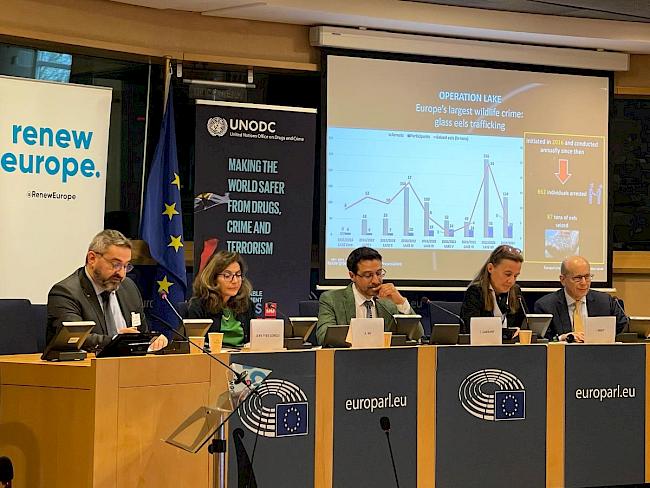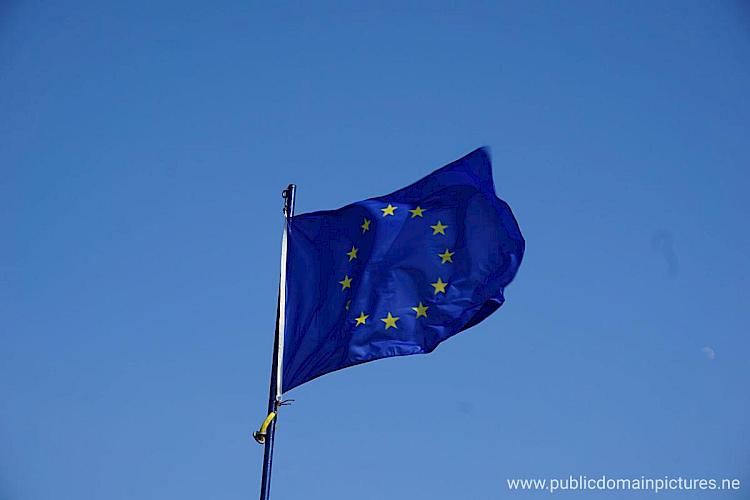Environmental Crime: Five years for the EU to turn the tide!
European leaders have issued an urgent rallying cry for international action to tackle environmental crime – a deeply disturbing and growing multi-billion-dollar industry which bankrolls criminal networks globally.
They were speaking at a high-level meeting held in the European Parliament on 26 March, which brought together more than 100 Members of European Parliament, representatives of government agencies, NGOs and media.
Richard Scobey, Executive Director of TRAFFIC, who spoke at the event, said:
With just five years within this EU legislative term to make progress, funding and collaborative action is urgent. These crimes, which include illegal wildlife trade, logging, fishing, and mining, don’t just destroy biodiversity but destabilize economies and threaten global security.”

The event was co-organised by TRAFFIC, United Nations Office on Drugs and Crime, the Spanish Guardia Civil, and WWF, with discussions covering EU policy, trade, security and finances, emphasising the effective implementation of the Environmental Crime Directive, the prioritisation of environmental crime in EMPACT (EU Policy Cycle of the European Multidisciplinary Platform on Addressing Criminal Threat), and funding prioritisation under the next EU budget.
Attendees included high-level decision-makers such as Executive Vice-President Teresa Ribera, Spain’s State Secretary of Interior Rafael Pérez Ruiz, French Gendarmerie Commander Fabrice Bouillie, as well as MEPs Michal Wiezik, Sirpa Pietikäinen, Marie Toussaint and Saskia Bricmont.

Anastasiya Timoshyna, TRAFFIC Europe Director, said:
It’s been a real beacon of hope to witness the participation and commitment of EU leaders to find urgent and collective solutions to tackle environmental crime. This EU legislative term opens a new page in better understanding and addressing environmental crime. This is so important, given the recent Europol report which yet again confirmed that the EU is a source, destination and transit hub for endemic wildlife trafficking.”
To effectively tackle environmental crime, a wide range of actors must be involved in a comprehensive and holistic strategic approach to the issue:
The private sector, including companies trading natural resources, transport companies and the banking sector must all play their part in not only preventing environmental crime, but also enabling sustainable and legal trade in natural resources, for the benefit of planet and people. Collaboration between law enforcement agencies, such as through the European Wildlife Information Exchange (EU TWIX) system, to keep one step ahead of criminal networks, is essential and requires further investment.
Environmental crime is inherently transnational and requires strong cooperation between countries. The EU must set an example in effective collaboration between EU Member States and with partner countries, not least through the EU GUARD Wildlife programme.
Supporting companies in tracing back their supply chains and ensuring the sustainability of their products, including through an ambitious implementation of the Corporate Sustainability Due Diligence Directive (CSDDD), is part of the solutions in preventing environmental crime.
The EU’s commitment to combating environmental crime cannot happen without matching funding support. The Multiannual Financial Framework (MFF) provides the financial backbone for implementing this ambition and will need to be reviewed considering the required investment to effectively address environmental crime and ensure legal and sustainable trade in wildlife. Member States will also need to step up financial support to these issues.



